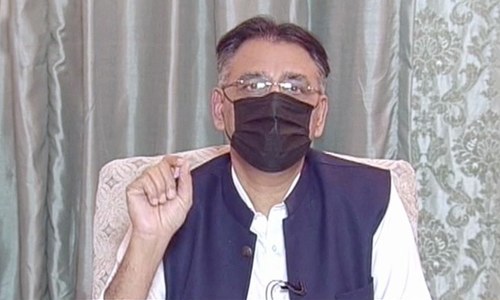ISLAMABAD: With only 20 per cent vaccine-eligible people fully vaccinated in Pakistan, mobility is going to become difficult for non-vaccinated people from Friday (today).
According to data shared by the National Command and Operation Centre (NCOC) on Thursday, 1,742 new cases of Covid-19 and 39 deaths caused by the disease were reported in a single day. The number of active cases was 47,832.
According to decisions of the NCOC, from Oct 1 only fully vaccinated people will be allowed to stay in transportation business of students and schools-related supplies. Similarly, only fully vaccinated people will be allowed to enter and work in shopping malls.
Moreover, only fully vaccinated people would be allowed domestic and international air travel and restriction will be both for inbound and outbound travellers.
However, to become eligible to travel in trains and buses people will have to be fully vaccinated by Oct 15. Similarly, only fully vaccinated people would be allowed to travel on highways and motorways after October 15.
Spokesperson for the Ministry of National Health Services Sajid Shah told Dawn that vaccine was available and thousands of vaccination centers were open in the country so people could not be allowed to play with the health of others by remaining unvaccinated.
Aviation Minister Ghulam Sarwar Khan said that only fully vaccinated travellers aged 18 and above would be permitted to fly within Pakistan.
He said in a tweet: “With effect from October 1, 2021, only fully vaccinated passengers of age 18 and above will be allowed to undertake domestic air travel within Pakistan.”
Meanwhile, the Civil Aviation Authority (CAA) has issued fresh Covid-19 vaccination guidelines on air travel to and from and within Pakistan.
It said unvaccinated Pakistani people between 15 and 18 years of age would be allowed domestic air travel up to November 1. Partial vaccination requirement would apply to them from November 1 and full vaccination requirement from December 1.
The CAA said Pakistani passengers less than 15 years of age would be allowed domestic air travel without vaccination requirement.
Foreigners/ foreign passport holders less than 18 years of age will be allowed travel within Pakistan without vaccination requirement.
Passengers medically advised against Covid-19 vaccination and holding a certificate from a classified specialist doctor will also be allowed to travel on domestic flights without vaccination certificate.
And foreigners or foreign passport holders who have travelled to Pakistan before October 1 will be allowed to continue their domestic air travel without vaccination certificate.
PMA concerned over dengue fever
The Pakistan Medical Association (PMA) has expressed concern over the rising cases of dengue fever in the country as, according to it, confirmed cases of dengue virus have been reported in thousands in all provinces.
“The situation is very alarming and we fear that it may become epidemic. Thanks God that at this stage number of cases of Covid-19 is decreasing but these could increase if people do not follow SOPs. Our weaker health delivery system cannot take the pressure of another outbreak of disease so government should immediately take preventive measures to control dengue fever,” the PMA said in a press statement. “Notably, dengue fever is a mosquito-borne tropical disease caused by the dengue virus. The weather conditions in the region remain suitable for spread of the infection and for growth of ‘aedes aegypti’, the mosquito that causes dengue fever. The symptoms of dengue fever appear three to fourteen days after infection and may include high fever, headache, vomiting, muscle and joint pains, eye pain, bones pain,” it said.
PMA Secretary General Dr Qaiser Sajjad said that all government departments should work jointly against dengue fever for positive results.
“Anti-mosquito spray with regular interval, particularly on stagnant water, should be done. Spray should also be done inside and outside of the hospitals, schools, offices, plant nurseries and gardens, tyre repair shops etc. Government should establish good quality laboratories for diagnoses of all types of viral diseases at big public sector hospitals and also make arrangements for collection of blood sample (collection centres) at their different link hospitals and dispensaries. Private hospitals should reduce the significant price of platelets and laboratory charges required for dengue fever tests,” he said.
Published in Dawn, October 1st, 2021















































Dear visitor, the comments section is undergoing an overhaul and will return soon.